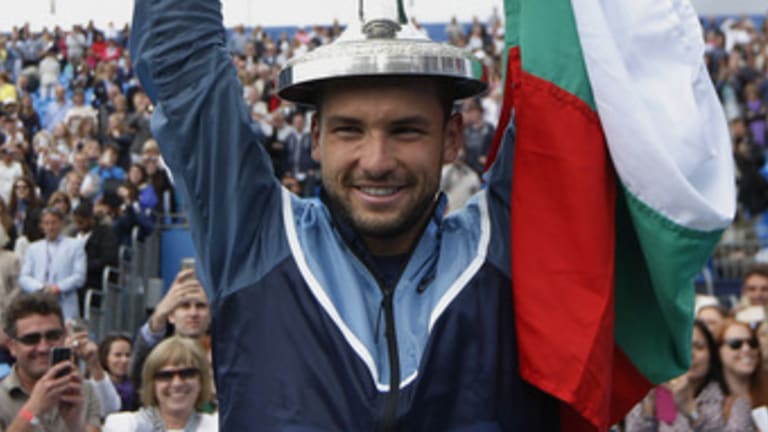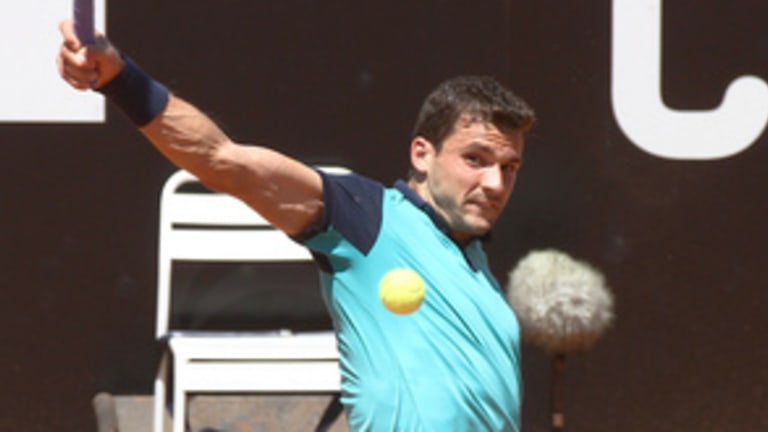It’s safe to say that Dimitrov is still trying to find his rhythm. His one-handed backhand, as much of a pleasure as it can be to watch, has always been a relative liability—at the very least, it makes it easy for his opponents to decide where to go against him. While there haven’t been any obvious changes to his strokes or strategies, there has been a noticeable dip in Dimitrov’s outward intensity this season. Last year, as his ranking ascended, he looked fired up, a man who was destined for better things. This year, as that ascent has stalled, he has looked emotionally flat during matches, and almost resigned in defeat.
At Queen’s, Dimitrov hinted that, after his breakthrough 2014, he has tried to take a more professional, “been there, done that” approach in 2015.
“You need to start repeating it,” he said of his title defenses, “...at some point you have worked so hard in your life and your tennis that you don’t want to be too much up and down. You want to do what you have done and eventually get better.”
Judging from his results so far this season, Dimitrov might want to start acting like he hasn’t been there and done that quite yet. In retrospect, it probably wasn’t a great sign when he closed out his 2014 by declining the chance to be an alternate at the World Tour Finals in November, even when he was already in London. The step from Top 10 to Top 5 is the hardest of all, and only an insatiable hunger is going to get you there.
It’s also possible that, in the future, Dimitrov might benefit from hearing a new voice. His coach, Roger Rasheed, has been instrumental in motivating him and taking him to the Top 10, but few coaching relationships last forever. As I’ve mentioned before, if Dimitrov wants a “polish up,” as he says, Paul Annacone, who mastered that art with Pete Sampras and Roger Federer, is nearby in Los Angeles.
But fist-pumps and tactical tweaks will only take him so far. Is Dimitrov and his throwback style destined to be one of the casualties of the Big 4 era? You can never say never. As recently as 2013, many of us thought the same thing about Stan Wawrinka; if there’s one thing the 30-year-old Wawrinka has shown everyone on the ATP tour, it’s that patience is a virtue. But Dimitrov will never have Wawrinka’s blistering, hit-my-way-out-of-anything pace, especially with his one-hander. And while his game has plenty of flash, it doesn’t lend itself to the physical grind that separates the Slam champs from everyone else these days. Even Muller had the power advantage over him in Queen's.
Dimitrov has tried to remain positive in his press conferences.
“I don’t think I’m playing bad tennis at the moment,” he said on his way out of Queen’s. “I just am doing a lot of good things on the court that really don’t discourage me to play.”
He says that while he’s disappointed with his early loss there, he’s happy to have the extra practice time before Wimbledon. He’ll need it: Dimitrov isn’t defending a title, but he’s defending something just as big, a semifinal run at a Grand Slam and the ranking points that come with it. The thought seemed to give him pause on Thursday.
"I'm just going to stay positive," he said. "Wimbledon is coming up. I'm going to have good time to get ready. Yeah, everything is going to be—I think everything is going to be fine for me."
Dimitrov's best chance may be to pretend that last year never happened.

